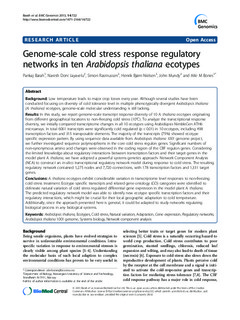| dc.contributor.author | Barah, Pankaj | |
| dc.contributor.author | Doni, Jayavelu Naresh | |
| dc.contributor.author | Rasmussen, Simon | |
| dc.contributor.author | Nielsen, Henrik Bjørn | |
| dc.contributor.author | Mundy, John | |
| dc.contributor.author | Bones, Atle M. | |
| dc.date.accessioned | 2017-11-07T14:07:20Z | |
| dc.date.available | 2017-11-07T14:07:20Z | |
| dc.date.created | 2013-10-30T16:18:28Z | |
| dc.date.issued | 2013 | |
| dc.identifier.citation | BMC Genomics. 2013, 14 (1), 1-18. | nb_NO |
| dc.identifier.issn | 1471-2164 | |
| dc.identifier.uri | http://hdl.handle.net/11250/2464713 | |
| dc.description.abstract | Background
Low temperature leads to major crop losses every year. Although several studies have been conducted focusing on diversity of cold tolerance level in multiple phenotypically divergent Arabidopsis thaliana (A. thaliana) ecotypes, genome-scale molecular understanding is still lacking.
Results
In this study, we report genome-scale transcript response diversity of 10 A. thaliana ecotypes originating from different geographical locations to non-freezing cold stress (10°C). To analyze the transcriptional response diversity, we initially compared transcriptome changes in all 10 ecotypes using Arabidopsis NimbleGen ATH6 microarrays. In total 6061 transcripts were significantly cold regulated (p < 0.01) in 10 ecotypes, including 498 transcription factors and 315 transposable elements. The majority of the transcripts (75%) showed ecotype specific expression pattern. By using sequence data available from Arabidopsis thaliana 1001 genome project, we further investigated sequence polymorphisms in the core cold stress regulon genes. Significant numbers of non-synonymous amino acid changes were observed in the coding region of the CBF regulon genes. Considering the limited knowledge about regulatory interactions between transcription factors and their target genes in the model plant A. thaliana, we have adopted a powerful systems genetics approach- Network Component Analysis (NCA) to construct an in-silico transcriptional regulatory network model during response to cold stress. The resulting regulatory network contained 1,275 nodes and 7,720 connections, with 178 transcription factors and 1,331 target genes.
Conclusions
A. thaliana ecotypes exhibit considerable variation in transcriptome level responses to non-freezing cold stress treatment. Ecotype specific transcripts and related gene ontology (GO) categories were identified to delineate natural variation of cold stress regulated differential gene expression in the model plant A. thaliana. The predicted regulatory network model was able to identify new ecotype specific transcription factors and their regulatory interactions, which might be crucial for their local geographic adaptation to cold temperature. Additionally, since the approach presented here is general, it could be adapted to study networks regulating biological process in any biological systems. | nb_NO |
| dc.language.iso | eng | nb_NO |
| dc.publisher | BioMed Central | nb_NO |
| dc.rights | Navngivelse 4.0 Internasjonal | * |
| dc.rights.uri | http://creativecommons.org/licenses/by/4.0/deed.no | * |
| dc.title | Genome-scale cold stress response regulatory networks in ten Arabidopsis thaliana ecotypes | nb_NO |
| dc.type | Journal article | nb_NO |
| dc.type | Peer reviewed | nb_NO |
| dc.description.version | publishedVersion | nb_NO |
| dc.source.pagenumber | 1-18 | nb_NO |
| dc.source.volume | 14 | nb_NO |
| dc.source.journal | BMC Genomics | nb_NO |
| dc.source.issue | 1 | nb_NO |
| dc.identifier.doi | 10.1186/1471-2164-14-722 | |
| dc.identifier.cristin | 1061725 | |
| dc.description.localcode | © 2013 Barah et al.; licensee BioMed Central Ltd. This is an open access article distributed under the terms of the Creative Commons Attribution License (http://creativecommons.org/licenses/by/2.0) | nb_NO |
| cristin.unitcode | 194,66,10,0 | |
| cristin.unitcode | 194,66,30,0 | |
| cristin.unitname | Institutt for biologi | |
| cristin.unitname | Institutt for kjemisk prosessteknologi | |
| cristin.ispublished | true | |
| cristin.fulltext | original | |
| cristin.qualitycode | 1 | |

